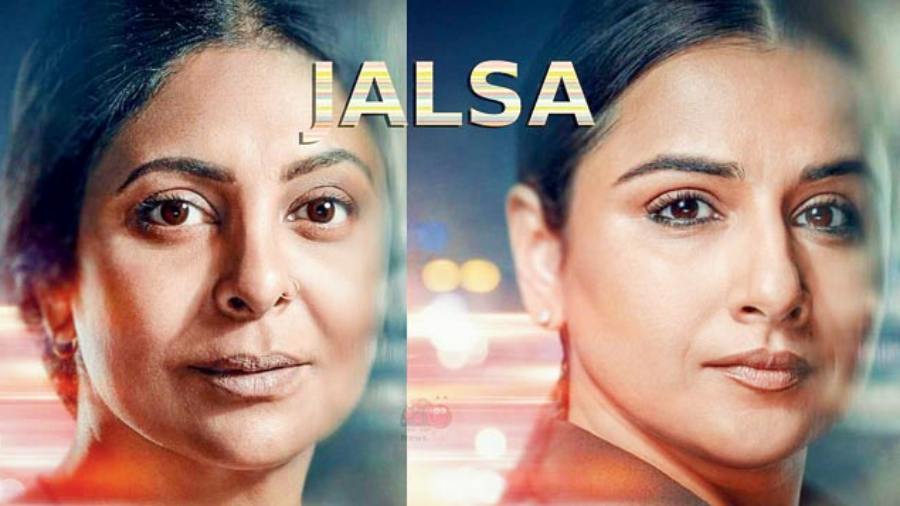Jalsa
Director: Suresh Triveni
Cast: Vidya Balan, Shefali Shah, Iqbal Khan, Rohini Hattangadi, Vidhatri Bandi, Manav Kaul
Running time: 126 minutes
The incident that forms the core of Jalsa takes place in a split second, but its reverberations — and repercussions — can be felt throughout the film. The incident plays out several times during the course of the film, always again for a split second, but every time it does so, it uncovers a new horror... of greed, of frailty of conscience, of the unreliability of decades-old principles, of the lengths (or rather depths) that one can go to to survive, at the cost of even those near and dear, in this dog-eat-dog world.
So an accident takes place. That’s no spoiler since the reveal is already present in the trailer. We know the victim and we know the perpetrator. But such is the complexity of the circumstances in Jalsa — which could happen to you, me and just about anyone — that we end up feeling for both. Life often thrusts us into unanticipated moments, and by the time we try and wrest control, for better or for worse, things spiral dangerously, often changing life in ways we never thought it could.
That’s what happens in Jalsa. Director Suresh Triveni, who gave us the sunshine-y Tumhari Sulu a few years ago, hits the ground running with his second film. Jalsa, just released on Amazon Prime Video, is relentlessly dark, relying on a ticking time-bomb narrative that works in keeping the viewer on edge constantly, sometimes even when nothing happens on screen. A feeling of claustrophobia seeps into the fabric of the film, slowly spreads its tentacles around it and then completely engulfs it. This is slow-burn thriller at its best.
And yet, Jalsa isn’t really a thriller. It’s a sharp and keenly observed study of human psychology where no one is the villain, and yet almost everyone is complicit in some way or the other.
Vidya Balan and Shefali Shah’s faces are the canvas through which the myriad emotions of guilt and grief, desperation and despair, frustration and fear play out in Jalsa. The story — which has Triveni teaming up with Prajwal Chandrashekhar, and has Hussain Dalal and Abbas Dalal penning the dialogues — places the two women on extreme ends of the have-have not spectrum. Vidya is alpha female Maya Menon, a luminary in the field of journalism who asks tough questions and is armed with an arsenal of tougher stares. She’s the kind of woman who intimidates anyone easily, has her boss (Iqbal Khan in a fine cameo as “the dirty business guy”) wrapped around her little finger in more ways than one and prides herself on her journalistic principles, though she isn’t averse to bending, and sometimes breaking, some rules along the way. Maya, in short, is a tigress at work.
At home, however, Maya relies heavily on her house help Rukhsana, played by Shefali. Rukhsana not only keeps things running in the Menon household like a well-oiled machine, but is also friend and confidante to Maya’s physically challenged son. The lives of the two women are miles apart — Rukhsana lets her silences speak, Maya barks orders and plays heavy metal at inappropriate decibel levels, even in her office cubicle, to drown out the voices in her head.
But what binds them together is the fact that both are mothers, fiercely protective of their children. So when one of them is thrown into a situation where she stands to lose her child, the other — in ways none of them had fathomed — becomes inexorably involved.
Along with being an emotional drama, a social thriller and a succinct study of human psychology, Jalsa is also a satire. The title in itself is satirical, revealing its roots only in the film’s penultimate moments. One’s tragedy is another’s celebration and Jalsa looks at the vagaries of greed and the peddling of tragedy, often by those right in the middle of it. It’s powerful and poignant and a punch to the gut because what unfolds often ends up being relatable in ways too close for comfort. This is a real world peopled by real characters.
Playing out in muted shades of grey to match the tone of the film and operating at a nervous pace, Jalsa benefits immensely from Shivkumar V. Panicker’s crisp editing and Saurabh Goswami’s lenswork.
The camera often lingers on the faces of its players, particularly the two women in the centre, relentlessly capturing every twitch of the eyebrow, every bite on the lip. Vidya Balan, in particular, shines in a role that gives her more meat than her
co-star. When her hands tremble uncontrollably, you feel it. When she lets out a bloodcurdling scream, it stays with you much after. The very Lady Macbeth moment of trying to wash the blood off her hands and then looking at herself in the mirror, at a person she no longer recognises, is a definitive cinematic moment. So also is the one where Shefali’s Rukhsana stares, her eyes dried off tears, at the waves lashing the beach. There is singing, signifying hope and life, close by, as the two women sit in shared silence. That’s what Jalsa is... a sometimes beautiful, sometimes ugly blend of scream and silence.











